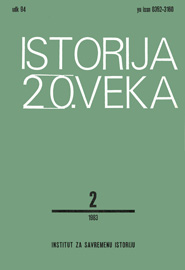MEĐUNARODNI PROBLEMI U POLITICI KPJ 1928 - 1934. GOD.
INTERNATIONAL PROBLEMS IN THE POLICY OF THE YUGOSLAV COMMUNIST PARTY FROM 1928 - 1934
Author(s): Vuk VinaverSubject(s): Diplomatic history, Political history, Social history, Recent History (1900 till today), Interwar Period (1920 - 1939), History of Communism
Published by: Institut za savremenu istoriju, Beograd
Keywords: Kingdom of Yugoslavia; KPJ (Communist Party of Yugoslavia); international problems; diplomacy; Comintern; interwar period; revolution;
Summary/Abstract: The years 1928 - 1934 marked a new „leftist period" in the European revolutionary movement. This was an era of great progress in the USSR and of propaganda concerning the dangers of capitalist intervention. The Comintern, meanwhile, considered that it was its duty to begin a large-scale and open struggle against social democracy as the main obstacle to revolution, and against bourgeois regimes who were considered to be preparing an attack on the Soviet Union. A ll European communist parties joined in the struggle „class against class". This same struggle was taken up by the Yugoslav communist party, the Bulgarian communist party and those of Hungary, Romania and Italy etc. Since Yugoslavia was riven by internal strife and under a monarchist dictatorship, the Yugoslav communist party believed that it was possible to assemble the nationally and socially suppressed masses and to carry out a revolution. The Yugoslav revolution was to fit into the general Balkanic-Danubian revolution which would destroy the capitalist system, fascit regimes and the system of intervention and imperialist wars. The struggle to attract the suppressed masses, for this reason, was linked to the breaking up of the Yugoslav state „the prison of the people". However, this did not only refer to the well-known disintegration of Yugoslavia, but also to the destruction of the old system throughout the whole of south eastern Europe. There was an evident difference between Soviet foreign policy and the policy of the Comintern, although some observers believed that the Comintern only carried out the foreign political program of the USSR to the letter. The deterioration of the economic situation in 1931 - 1932 convinced the Comintern that it was indispensable to start a revolution as soon as possible, whilst Soviet foreign policy was focused on cooperation and coexistence. The Yugoslav communist party sharply condemned the Yugoslav dispute with Italy and Bulgaria and attacked the French system of which Yugoslavia was a member. In 1933, the Comintern believed that a time of war and revolution was imminent, but under pressure of German events in 1934, had to change and proclaim it the year of „the united front", a forerunner of the national front. The Yugoslav communist party had always carried out the policy of the Comintern obediently, but it adjusted it to the Yugoslav situation. Owing to this, there had always been a certain doubt in the full regularity of the Comintern’s course and greater attention had been devoted, for example, to the Yugoslav-Italian dispute than to the theory of anti-soviet intervention. In a fierce struggle against the dictatorship the Yugoslav communist party acquired enormous moral influence and then the new policy of the national front was to enhance the authority of the Yugoslav communist party so consequently beginning from 1936 - 37, it became the only alternative to the existing bourgeois system. The study was written on the basis of Comintern documents as well as on the basis of reports of foreign emissaries from Yugoslavia and Comintern and Yugoslav revolutionary press documentation was also used. The greatest attention has been dedicated to comparing the course in the policy conducted by the Yugoslav communist party with the course of the policies conducted by the communist parties of Yugoslavia’s neighbors.
Journal: Istorija 20. veka
- Issue Year: 1983
- Issue No: 2
- Page Range: 7-35
- Page Count: 29
- Language: Serbian

